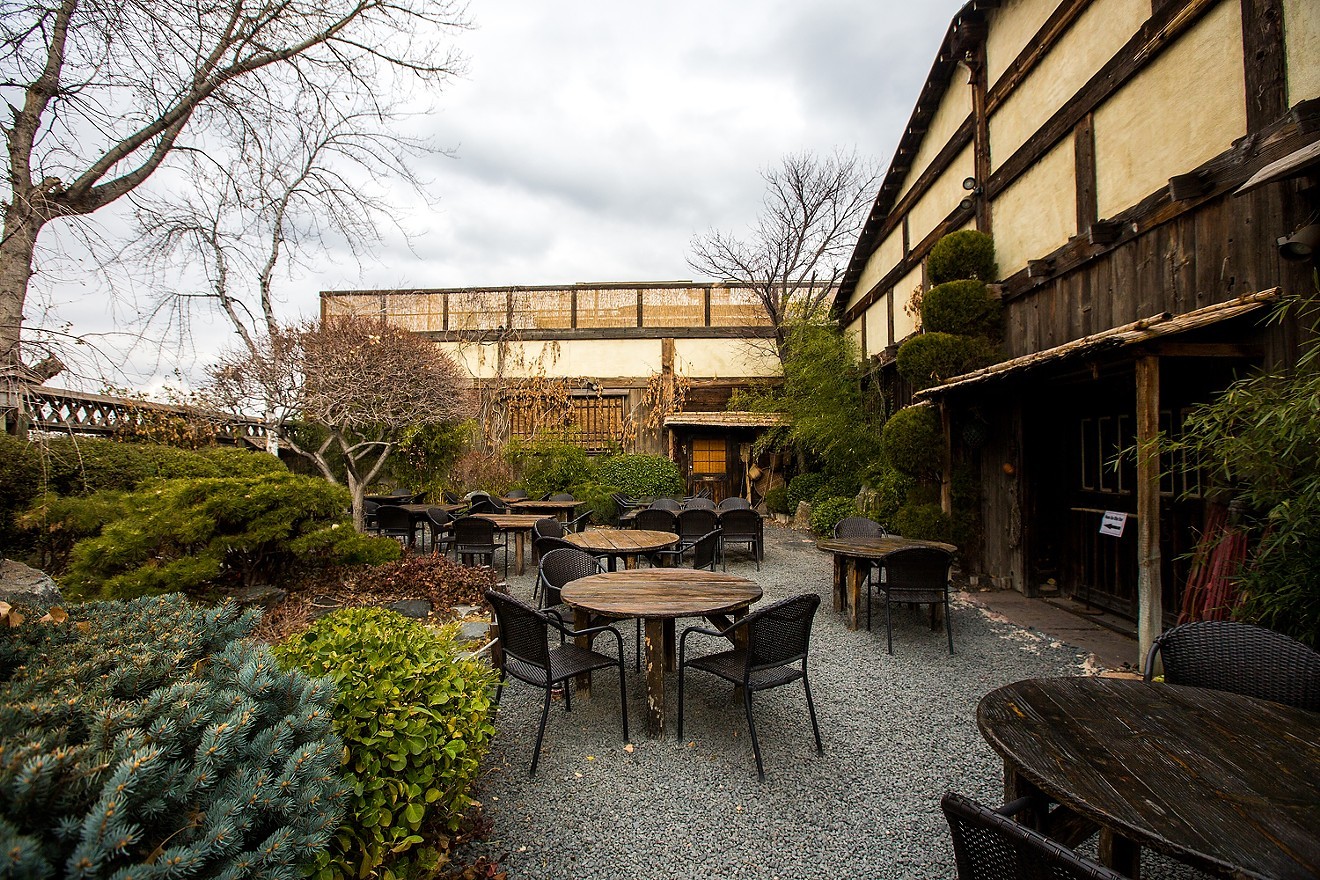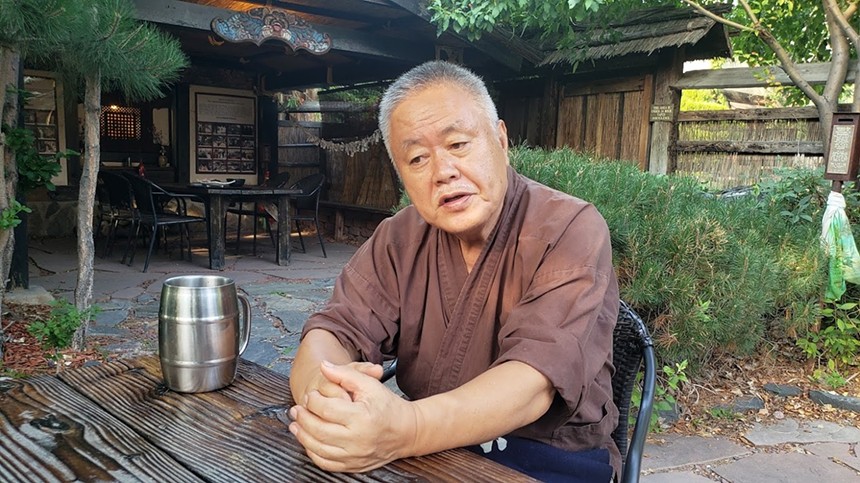"When will Domo reopen?"
That's been the big question for anyone who loves Japanese food in Denver, and now we have the answer: Never. The restaurant at 1365 Osage Street is gone for good.
In August 2021, a TikTok video showing the restaurant’s charms went viral and forced its owner, Gaku Homma, to temporarily shut down after crowds of people lined up to dine there. It was too much of a good thing.
Domo eventually reopened, but Homma was overworked and understaffed. After he limited both Domo’s hours and capacity to make the load manageable for the staff he had, the restaurant limped along for a couple of months. But ultimately, he felt that he wouldn’t be able to maintain either the quality of the food or the service.
“The number of customers at Domo reached the highest level in the end of last year, and I started to think, ‘If ever more customers were to come to enjoy Domo, I wouldn't be able to keep up with the quality of service I want to offer, and that could lead to losing the good reputation that Domo has cultivated since its inception and on which Domo is built,’” he says in a translated text. “And that was when I decided to slow down and cool down, and that decision leads us to today.”
And today, Domo is officially closed. The restaurant that earned such rave reviews is no more. But the property remains.
Forty years ago, Homma built an aikido dojo, Nippon-Kan, in an old warehouse in a long-overlooked area south of Colfax Avenue near the Auraria campus and created a nonprofit to run it. Not long after, he added a unique Japanese restaurant to the complex, one that even visiting Japanese found awe-inspiring. The tables were Colorado granite, the seats were tree stumps with a bit of cushion covering them (not exactly comfortable, but full of Rocky Mountain charm), and the overhead lights were gnarly branches with lacquered Japanese newspapers serving as lampshades. Outside the back door, Homma Sensei and his students built a fine traditional Japanese garden with a koi pond and bonsai trees, where diners could commune with nature as they ate during the warmer months.
And that wasn't all: Homma put his collection of traditional Japanese artifacts on display in a small museum space he created in an attached wing that opened onto the tatami-covered aikido classroom on one side, and a historically accurate nineteenth-century Japanese farmhouse on the other, with overflow seating for the restaurant in the center. Behind this museum, a dormitory housed some aikido students.
The aikido classes are currently suspended, but the nonprofit that Homma started in 1978, the Aikido Humanitarian Active Network, is still going. In fact, Homma recently returned from an international trip to reconnect with some of the projects AHAN supports around the globe, including aikido classes in Southeast Asia, orphanages in poverty-stricken countries, and modern classrooms (with donated used computers) in Latin America and Mongolia.
“During the coronavirus pandemic, I have had to be away from these overseas projects that I have been supporting abroad, and as various travel restrictions are being lifted lately, I have been resuming these activities in the last few months,” Homma says. “Because of this, it has been very difficult to keep Domo open.”
During his travels, he adds, “One of the places I went to visit is Bilay House in Thailand, where orphans from Myanmar and other children separated from their parents and guardians in Myanmar are living together, with access to education and medicine after having fled their country. I not only provided the seed money to establish this facility twelve years ago, but have continued providing financial resources and other resources, e.g. volunteers, my knowledge and advice, etc., since its inception, and over sixty children are currently living together at the facility.”
He also went to Nepal to teach aikido to that country’s special forces soldiers and to work with the Nepal Down Syndrome Association, which he’s supported financially. He traveled to Vietnam to teach aikido and visit physically challenged children who suffer from the effects of Agent Orange used during the Vietnam War. Later this year, he hopes to travel to majority Muslim countries to see how he can help communities there, either with aikido training or through his many charitable projects.
Although developers are certainly interested, Nippon-Kan's board of directors is holding onto the Denver property for now, and Homma is occasionally hosting events at the space, but without any food service. A Japanese language school for kids has made field trips there on recent weekends, and Homma is open to non-profit organizations using the place for meetings or other events. He might bring back his aikido classes. But he has no plans to reopen Domo.
Homma is now 72, and says he wanted to retire at seventy from restaurant work. He repeats in Japanese what he said last year: “Mo tsukareta, yo.” He's tired...of restaurants, at least. But Homma still has plenty to do.
Organizations interested in booking Domo can leave messages for Gaku Homma at 303-595-8256; find more information on the dojo here.
[
{
"name": "Air - MediumRectangle - Inline Content - Mobile Display Size",
"component": "12017618",
"insertPoint": "2",
"requiredCountToDisplay": "2"
},{
"name": "Editor Picks",
"component": "17242653",
"insertPoint": "4",
"requiredCountToDisplay": "1"
},{
"name": "Inline Links",
"component": "18838239",
"insertPoint": "8th",
"startingPoint": 8,
"requiredCountToDisplay": "7",
"maxInsertions": 25
},{
"name": "Air - MediumRectangle - Combo - Inline Content",
"component": "17261320",
"insertPoint": "8th",
"startingPoint": 8,
"requiredCountToDisplay": "7",
"maxInsertions": 25
},{
"name": "Inline Links",
"component": "18838239",
"insertPoint": "8th",
"startingPoint": 12,
"requiredCountToDisplay": "11",
"maxInsertions": 25
},{
"name": "Air - Leaderboard Tower - Combo - Inline Content",
"component": "17261321",
"insertPoint": "8th",
"startingPoint": 12,
"requiredCountToDisplay": "11",
"maxInsertions": 25
}
]












